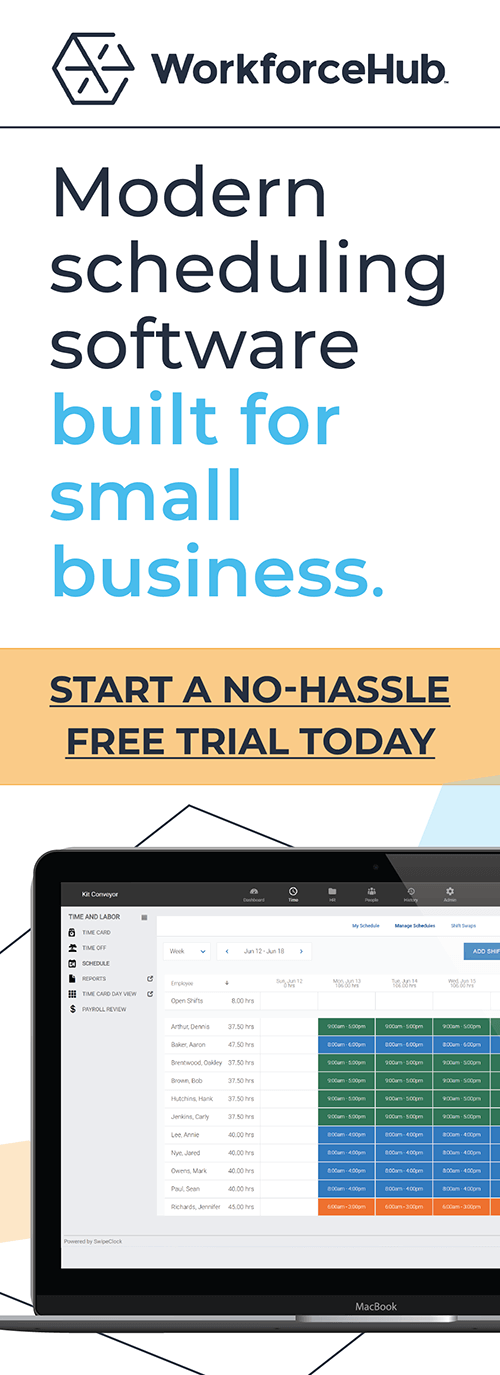Your Employees May Be Tracking Time Better Than You Are

Are you tracking time and attendance accurately? If not, someone else may be doing it. And that someone may be one of your employees.
If you don’t have a reliable employee timekeeping system, you are at risk of a wage and hour lawsuit.
Employees Can Track Time With a Free App From The Department of Labor
The Department of Labor has a time tracking app that anyone can download from their site. There are also plenty of free employee timekeeping apps sold by workforce management vendors.
With a time tracking app, an employee can track their hours automatically and calculate their wages. The app will compile and store the records. An employee can do all this on their phone just as easily as they can text a friend.
Worried That Your System Is Inadequate?
It is no longer a luxury for employers to have automated employee time tracking, scheduling, and reporting. If you suspect that your timekeeping system is sub-par, it probably is.
Why is it so important to automate timekeeping?[
Employment Lawsuits Cost Business Owners Millions
Employment violations are increasing at a staggering rate. In 2017, U.S. employers paid $2.72 billion in labor settlements. This includes back wages plus punitive damages. A single employee can bring a suit. But class action cases cost the most to settle.
Increased Public Awareness of Wage and Hour Laws
In 2015, the Department of Labor tried to increase the “white-collar” overtime threshold. This shone a light on wage and hour laws. Workplace regulations continued to receive attention as many well-known companies like Fed Ex and The Cheesecake Factory were taken to court by employees. Just a couple days ago, President Trump’s former driver sued him, claiming unpaid overtime. Minimum wage and scheduling laws have also kept employment issues in the news.
The Fair Labor Standards Act and the Modern Workforce
The Fair Labor Standards Act (FLSA) was passed in 1938 when employment was vastly different. Workers punched a clock at factories and offices. There were no computers or gig workers. There are now job roles and working arrangements that didn’t exist when it was enacted. Employers have difficulty applying the provisions to scenarios that lawmakers could not have anticipated. This ambiguity has left many employers with unexpected legal exposure.
A Cash Cow for Employment Attorneys
When it comes to employment litigation, wage and hour lawsuits are very lucrative for plaintiffs’ attorneys. Most companies are likely to settle rather than prolong a case. With increased awareness of regulations, employees bring challenges to current and former employers.
It’s not just Federal cases that get the attention of the legal community. Additional laws on the state and local level have provided more opportunity for profit. Hybrid lawsuits are also on the rise. This is where the employee claims redress under the FLSA and state law.
Wage and Hour Violations
It’s important to remember that employers found in violation fall into many camps. There are those that intentionally shortchange workers but some are simply careless or don’t understand the laws. Misclassifying employees as independent contractors is a common violation. Employers don’t have to pay overtime and other benefits to legitimate independent contractors. It’s tempting to save all that money. But the qualifications for independent contractor status are stringent. An employee must meet all of the conditions—not just one or two—to qualify under the law.
Some employers commit wage fraud by requiring employees to perform work off the clock. Even asking a worker to change into a uniform before clocking in is illegal. Disney committed this violation and was subject to a hefty fine.
Honest, well-meaning employers are also at risk. Sometimes a caring business owner helps an employee out with a short-term cash loan. Then they deduct loan payments from the worker’s paycheck. This may sound reasonable—but it’s illegal. Employers can only deduct taxes and benefits from wages. Employers who lend an employee some money need to treat it as a completely separate transaction.
Employee breaks can be tricky. You generally have to pay an hourly worker for short breaks. It’s probably okay to require an employee to clock out for a longer meal break. But you can’t have that employee work while on the break. If you ask your receptionist to eat at her desk and take any calls that come in during the meal—you have to pay her for the time. Your state may have laws about meals and breaks that are stricter than the FLSA. If you are unsure, get professional legal counsel.
Remember that you can be in violation even if an employee has agreed to the working arrangement. A small business owner may hire a part-time agent to resolve infrequent client tech support issues. The employee agrees to be paid just for time spent working—but they are essentially always “on call.” The employer may be in violation of a Federal or state scheduling or minimum wage law.
If you are still using a manual time and attendance system, you are more likely to lose in a wage and hour dispute. Here are ways you can protect yourself.
1. Use Advanced Time and Attendance Software
The most important thing to do is automate time and attendance. Employee timekeeping software will measure time precisely and compile accurate records. It is as easy to use as the free DOL app but has many additional tools. Once you have implemented a system, make sure you train your employees to use it correctly.
2. Understand The Laws
Make sure you know the FLSA, state laws, and Affordable Care Act requirements. If you operate a long-term care facility, you are subject to Payroll Based Journal. Seek the advice of an employment attorney if you are unsure of your legal obligations.
3. Educate Managers
Your managers can help protect you. They must also understand the laws and company policies. They are the ones who will approve overtime, time cards, and shift changes. They can ensure you follow all the workplace laws that apply to your business.
SwipeClock automated time and attendance software protect business owners from violations. To learn how SwipeClock can decrease your labor audit liability, request a demo today.
By Liz Strikwerda
Simplify HR management today.
Simplify HR management today.
Everything You Need to Know About the Corporate Transparency Act (And How It Impacts Your Business)
Staying current on legislation that may impact your business or impose new regulations is vital to remaining in compliance and avoiding costly fines. One piece of legislation that affects nearly all businesses under $5 million in gross revenue is the Corporate Transparency Act. If your business gross revenue comes in under that threshold and you…
Read MoreThe Importance of Facial Recognition Time Clocks for Small Businesses
Updated April 17, 2024 A facial recognition time clock is no longer a luxury. Advanced biometric clocks are a must-have for today’s workplaces. A facial recognition time clock is the best technology for tracking employee time. It solves a multitude of problems employers are facing with their workforces. What is a Facial Recognition Time Clock?…
Read More





